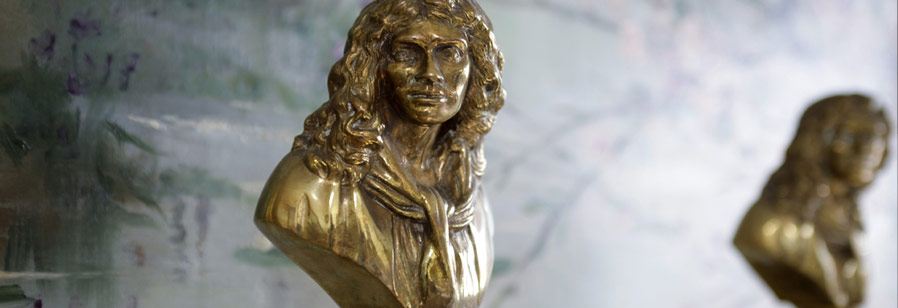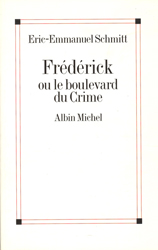Resumen
Frédérick fascina a Paris. Actor conocido, personaje extravagante, juguetón, seductor, revolucionario, parece dispuesto a todo menos al amor.¿ La pasión ? La interpreta o la compra ya hecha. Cuando conoce a Bérénice, Una joven misteriosa que no pertenece al mundo del teatro, va a tener que escoger : ¿ El amor soñado o el amor vivido ? ¿ El escenario o la vida ?
Comentarios del autor
« Frédérick, es un regalo de... »
Frédérick, es un regalo de mis éxitos anteriores. Porque tenían confianza en mí, porque Jean-Paul Belmondo, estrella entre las estrellas, quería interpretar una obra mía, me pude permitir multiplicar los personajes, los decorados y las peripecias. Por primera vez, escribí no sólo una obra sino un espectáculo. Creía que la historia de Frédérick se limitaría a su puesta en escena parisina, no imaginaba por entonces que en el extranjero la obra sería también válida para el teatro subvencionado, que posee sus propias compañías, ni que tres meses después de su estreno francés, asistiría en el teatro de Colonia, a su maravillosa versión alemana tan poética que dirigió Torsten Fisher.Quise escribir una obra popular, directa, franca, nítida, con colores claros y vivos ; a pesar de mí, la duda y la melancolía ocuparon el lugar importante que tienen en mi espíritu y pusieron sus tintes crepusculares. También quise hacer reir ; a pesar de mí, me sorprendí haciendo llorar. La obra, que, al principio, se burla del melodrama, llegando incluso a parodiarlo en el Auberge des Adrets, se muestra sin embargo como un melodrama. Descubriendo esto bajo mi pluma, me agarré a esta construcción perversa que me tendía trampas deliciosamente : evacuando la emoción disimuladamente, la restauraba, de manera insidiosa, eficazmente. Frédérick transmite el amor infantil que siento hacia el teatro. El teatro es un lugar que, como la iglesia, nos llena de esperanza cuando penetramos en él : todo es posible, murmura la sala, aquí puede pasar de todo, los muertos se levantan, las heridas no duelen, las historias vuelven a empezar, los hombres no envejecen, un varón puede convertirse en hembra, se fustiga lo ridículo y eventualmente se castiga la maldad. La sala de teatro iluminada por los destellos de los sueños que proyectamos, aligerada por el cómodo sentimiento de irrealidad, perfumada de impaciencia, calentada por nuestros placeres anticipados, la sala de teatro ofrece una burbuja protegida donde no sólo se reproduce la vida si no que se reflexiona sobre ella, se la corrige. Frédérick, cuya infancia no fue feliz junto a una madre arisca y desprovista de amor, se ha refugiado en el teatro para vivir su vida, o mejor dicho para vivir sus vidas porque tiene tantas como papeles. Gracias al teatro será mil personas en su tiempo terrestre mientras que millones de humanos corrientes están limitados a un solo papel en un único cuerpo. Esta pluralidad fundamental que le permite su arte, se muestra también como una duplicidad fundamental : nunca sabe cuando es sincero, acostumbrado no a mentir, pero a crear en él cada noche diversas emociones, se ha perdido en el laberinto de su virtuosismo, se ha perdido de vista, ha olvidado su propia vida. Bérénice lo trae de vuelta a la realidad : esta vez, frente a ella, ya no se trata de representar el amor, sino de comprometerse. Frédérick, experto en emociones, no cree estar dotado para los sentimientos ; es que estos, a diferencia de las emociones intensas, inmediatas, efímeras, tan pronto vividas como desvanecidas, piden anclarse en el tiempo, constituyen las elecciones de una vida y forman la osamenta de una personalidad. Receloso de sí mismo, Frédérick sacrificará el amor por amor. Por respeto y devoción hacia Bérénice, rechaza imponerle lo que él cree ser su inconsistencia.No se da cuenta de que precisamente su lucidez le aporta profundidad, que es su transparencia que le vuelve opaco.Por ahí, he querido describir lo que he aprendido de los actores durante estos últimos años. Contrariamente a las ideas preconcebidas, no son narcisistas, ni egocéntricos. No son narcisistas porque Narciso se ama y admira tal y como es, el espejo es un amante suficiente ; sin embargo los actores han escogido no ser ellos mismos y de hacerse amar por una personalidad que no es la suya. No son tampoco egocéntricos, porque el egocéntrico, para pensar sólo en sí mismo, necesita conocerse a sí mismo, estar en contacto íntimo con su ego ; sin embargo los actores dudan de su propia personalidad, prefieren mostrar una de prestado ; si a veces se preocupan mucho de sus carreras y de su aspecto no es más que egocentrismo por falta de ego ; si tienen un ego, es a lo sumo el ego de una percha que se preocupase por tener colgados los trajes más bellos desapareciendo bajo ellos. Este dudar de sí mismo, esta necesidad constante de la aprobación del otro, de los aplausos del público, son una característica existencial del actor y provienen a menudo de una herida primordial.La mayoría de intérpretes que he conocido tenían como una falta de amor, desde la infancia. Esta carencia de afecto y de reconocimiento gangrena su vida, la dinamiza también porque les empuja a interpretar siempre más, para obtener más éxito, agotándolos en una carrera hacia la gloria incompleta, por insuficiente.Me he inspirado no sólo de mis frecuentes visitas entre bastidores, también de Frédérick Lemaître, el verdadero Frédérick Lemaître, primer actor popular de nuestra historia, figura mítica del actor del siglo XIX.Esto me permitía contar también la invención del teatro popular, en el bulevar del crímen, un teatro que se dirigía, como el cine de hoy, a todas las capas de la sociedad, que representaba las esperanzas del pueblo, un teatro político nacido de la revolución, un teatro que quería entretener siempre, provocar a menudo, hacer pensar a veces, pero que sobre todo no quería aburrir como el de hoy, ni educar didácticamente a las masas supuestamente incultas que de hecho para vengarse del menosprecio del que son objeto por parte de los intelectuales teatrales, acaban por dejar vacías la butacas. Frédérick, porque es actor, es un personaje muy diferente a todos los otros que he escrito : no es reflexivo, no se comenta, se interroga poco, actúa. Cercano a los personajes de Alejandro Dumas, que representa en escena, Frédérick es un héroe : el único que he compuesto : chulo, audaz, impulsivo, tiene el don de la improvisación y no quiere otra cosa que rebotar de palabra acertada en palabra acertada, de aventura en aventura. Solar, distribuye todos sus rayos, sólo existe existiendo, es el presente en estado puro. Después de todos los personajes oscuros, contradictorios y contradichos que había construido, su llegada me dió la felicidad de algo verdaderamente refrescanteZermat, Suiza, el 25 de febrero de 2000Eric-Emmanuel-Schmitt

